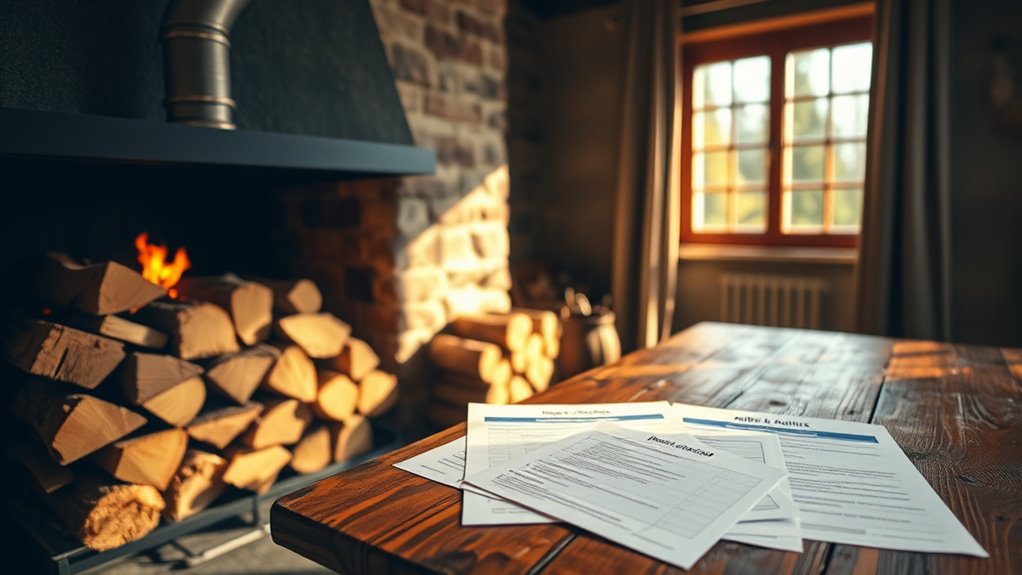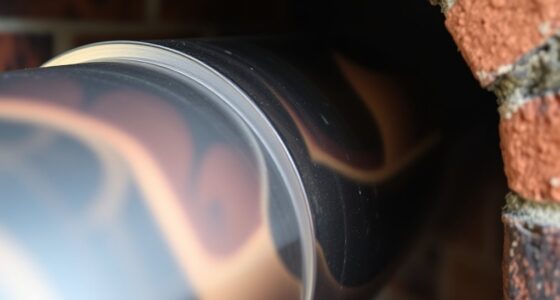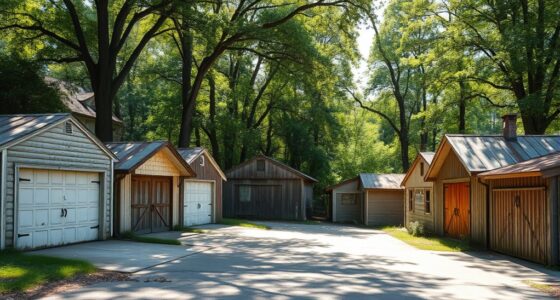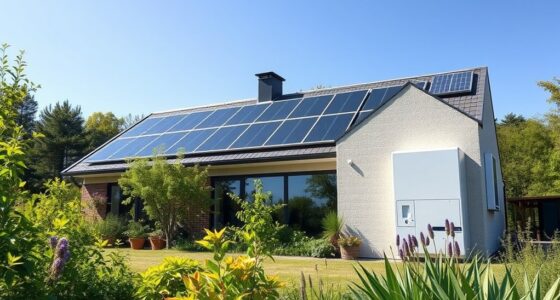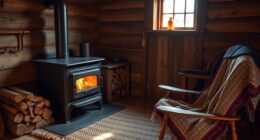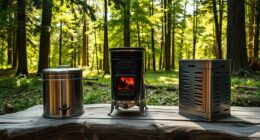To make certain your solid-fuel heating system is covered, you need to check if your insurance policy includes hazard coverage for fire, smoke, and firefighting water damage caused by such systems. Make sure to disclose the system during the application, follow safety requirements like regular chimney inspections, and avoid common exclusions such as improper installation or non-approved fuels. Staying informed about your policy details helps protect against surprises—keep exploring to learn more about safeguarding your system and home.
Key Takeaways
- Verify if hazard coverage includes damages caused by solid-fuel heating systems, such as fires or smoke damage.
- Disclose the presence of solid-fuel systems during policy application to ensure proper coverage.
- Follow safety requirements like regular chimney inspections and proper venting to meet insurer standards.
- Review policy exclusions related to heating systems and maintenance to understand coverage limits.
- Implement safety measures and proper installation to reduce risks and prevent claim denials.
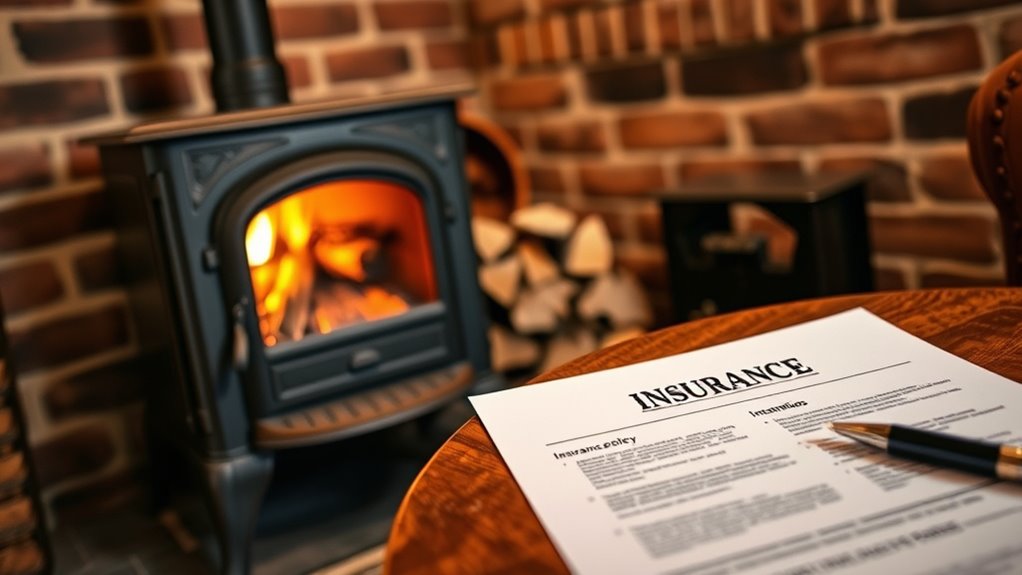
Are you aware of the insurance requirements for using solid-fuel heating systems? If you’ve recently installed or plan to operate a stove or fireplace that burns wood, coal, or other solid fuels, it’s essential to understand how your insurance policy covers these systems. Many homeowners assume their standard policy protects against all potential risks, but in reality, there are specific considerations you need to keep in mind, especially concerning hazard coverage and policy exclusions.
Understanding your insurance coverage for solid-fuel heating systems is essential to avoid unexpected costs.
First, you should check whether your current policy includes hazard coverage for damage caused by solid-fuel heating systems. Hazard coverage typically protects against risks like fire, smoke damage, and sometimes even water damage resulting from firefighting efforts. However, not all policies automatically extend this coverage to damages caused specifically by the operation of a solid-fuel stove or fireplace. If your policy doesn’t explicitly include hazard coverage for these systems, you might find yourself responsible for costly repairs or rebuilds should an incident occur. It’s wise to speak with your insurance agent to clarify whether your policy provides adequate hazard coverage related to solid-fuel heat sources.
In addition, policy exclusions play a significant role in determining what your insurance will and won’t cover. Many policies have exclusions related to certain types of heating systems or specific causes of damage. For example, some policies may exclude coverage if the damage results from improper installation, lack of maintenance, or the use of non-approved fuels. Others might exclude coverage for damages caused by creosote buildup or chimney fires, which are common hazards associated with wood-burning systems. Understanding these exclusions is essential because they can leave you vulnerable to significant out-of-pocket expenses if a problem arises. Always review your policy’s fine print or consult your insurer to identify any exclusions that could impact hazard coverage related to your solid-fuel system.
Moreover, insurers may require you to take certain safety precautions, such as installing proper venting, regular chimney inspections, or smoke detectors, to maintain coverage. Failure to adhere to these safety measures could result in denied claims if a fire or damage occurs. It’s also worth noting that some policies might require you to disclose the presence of your solid-fuel heating system during the application process, ensuring that the insurer is fully aware and can adjust the policy accordingly. Additionally, understanding fire risk mitigation measures can help you stay compliant with your policy requirements and reduce potential liabilities. Staying informed about insurance policy details related to your heating system can also prevent surprises in the event of a claim. Being aware of policy requirements can help you proactively meet safety standards and ensure coverage.
Frequently Asked Questions
Are There Specific Coverage Limits for Solid-Fuel Heat Appliances?
You should check your insurance policy, as coverage limits for solid-fuel heat appliances vary. Typically, policies can be customized to include specific coverage for these systems, ensuring you’re protected against potential damages or fire risks. It is crucial to review your policy details and discuss any necessary adjustments with your insurer to make sure your coverage limits adequately reflect the value and risks associated with your solid-fuel heating system.
How Does Insurance Vary by City or State Regulations?
Your insurance can vary considerably based on local regulations, as different cities or states may have unique safety standards for solid-fuel heat appliances. These local rules create insurance disparities, influencing coverage requirements and premiums. You should check your area’s specific regulations and consult your insurer to understand how these local factors impact your policy. Staying informed ensures you get the right coverage and remain compliant with regional safety laws.
Can Homeowners Customize Their Insurance Policies for Solid-Fuel Heat?
You can customize your insurance policies for solid-fuel heat, as about 65% of homeowners choose tailored coverage. This allows you to include specific protection for your heating system and related risks. Insurance providers offer customization options and policy tailoring to meet your unique needs, ensuring you’re adequately covered. Contact your insurer to explore these options, so you can confidently protect your home and heating system while accommodating your budget and safety requirements.
What Safety Inspections Are Required for Insurance Approval?
You need to schedule chimney inspections and guarantee your smoke detectors meet safety standards for insurance approval. Insurers typically require a professional chimney inspection to check for creosote buildup, cracks, or blockages. Additionally, smoke detectors must be installed and functioning correctly, with some policies requiring carbon monoxide detectors too. These safety inspections help verify your home’s fire safety measures, making it easier to get coverage and reduce potential risks.
Are There Discounts Available for Safety Upgrades or Maintenance?
Yes, you can get discounts for safety upgrades or maintenance. Many insurers offer discount programs, especially if you invest in safety features or regular maintenance. It’s almost like rewarding you for playing it safe—how ironic! By upgrading your solid-fuel heat system and staying on top of maintenance, you not only boost safety but also enjoy lower premiums through these discounts. So, take advantage of these programs and save some money!
Conclusion
Steering insurance for solid-fuel heat keeps you grounded like a sturdy oak amid life’s storms. By understanding the requirements, you shield your home and loved ones from unforeseen flames. Think of your insurance as a safety net woven with care, catching you when the unexpected sparks fly. Stay informed, stay protected, and let your peace of mind burn bright, knowing you’re prepared to face any challenge that comes your way.

